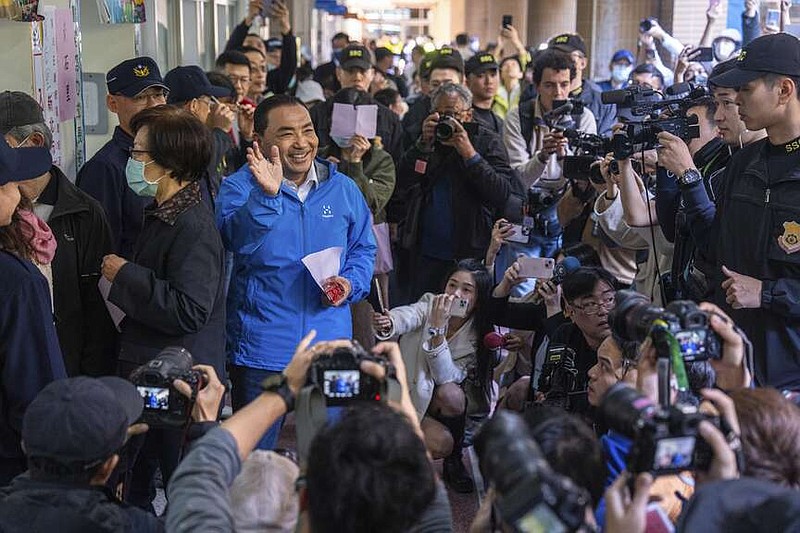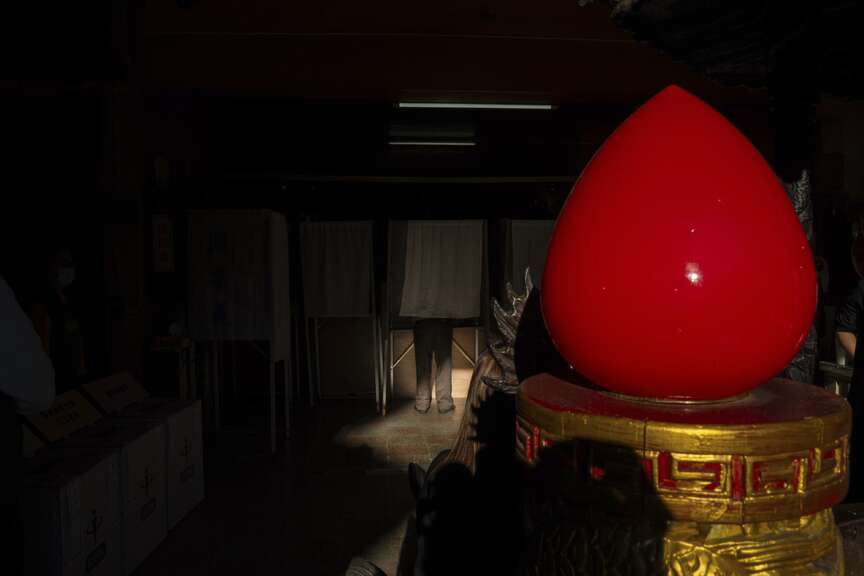TAIPEI, Taiwan -- Ruling-party candidate Lai Ching-te emerged victorious in Taiwan's presidential election on Saturday, a result that will determine the trajectory of the self-ruled democracy's contentious relations with China over the next four years.
China had called the poll a choice between war and peace. Beijing strongly opposes Lai, the current vice president who abandoned his medical career to pursue politics from the grassroots to the presidency.
At stake is peace, social stability and prosperity on the island, 100 miles off the coast of China, which Beijing claims as its own and to be retaken by force if necessary. China is run by the Communist Party, which allows no political opposition.
While domestic issues such as the sluggish economy and expensive housing also featured prominently in the campaign, Lai's Democratic Progressive Party's appeal to self-determination, social justice and rejection of China's threats ultimately won out. It's the first time a single party has led Taiwan for three consecutive four-year presidential terms since the first open presidential election in 1996.
At a post-election news conference, Lai thanked the Taiwanese electorate for "writing a new chapter in our democracy. We have shown the world how much we cherish our democracy. This is our unwavering commitment."
He added: "Taiwan will continue to walk side by side with democracies from around the world ... through our actions. The Taiwanese people have successfully resisted efforts from external forces to influence this election."
Lai supporter Hsieh Hsin-chou, a 57-year-old physical therapist, said he was "very proud" of the election result.
"We choose our own president in Taiwan. We are a country. We are a country. We are a light of the world. We love freedom. We love democracy. We [are] supposed to choose our new president," Hsieh said.
Lai and incumbent President Tsai Ing-wen reject China's sovereignty claims over Taiwan, a former Japanese colony that split from the Chinese mainland amid civil war in 1949. They have, however, offered to speak with Beijing, which has repeatedly refused to hold talks and called them separatists.
Beijing was believed to have favored the candidate from the more China-friendly Nationalist party, also known as Kuomintang, or KMT. Its candidate, Hou Yu-ih, also had promised to restart talks with China while bolstering national defense. He had vowed not to move toward unifying the two sides of the Taiwan Strait if elected.
In his concession speech, Hou apologized for "not working hard enough" to regain power for the KMT, which ran Taiwan under martial law for nearly four decades before democratic reforms in the 1980s.
"I let everyone down. I am here to express my sincerest apologies, I'm sorry," Hou said in front of an audience whose numbers fell well short of expectations.
Hou supporter David Chiau, who works in information technology, said the loss came as a shock, but he was pleased by the turnout for the KMT, which he had hoped could have merged with the opposition.
A third candidate in the race, Ko Wen-je of the smaller Taiwan People's Party, or TPP, had drawn the support particularly of young people wanting an alternative to the KMT and DPP, Taiwan's traditional opposing parties, which have largely taken turns governing since the 1990s.
U.S. Secretary of State Antony Blinken congratulated Lai on his victory.
"We also congratulate the Taiwan people for once again demonstrating the strength of their robust democratic system and electoral process," Blinken said in a statement.
Lai won nearly 5.6 million votes, amassing just over 40%, while Hou claimed 33.5%. Ko garnered 26.5%.
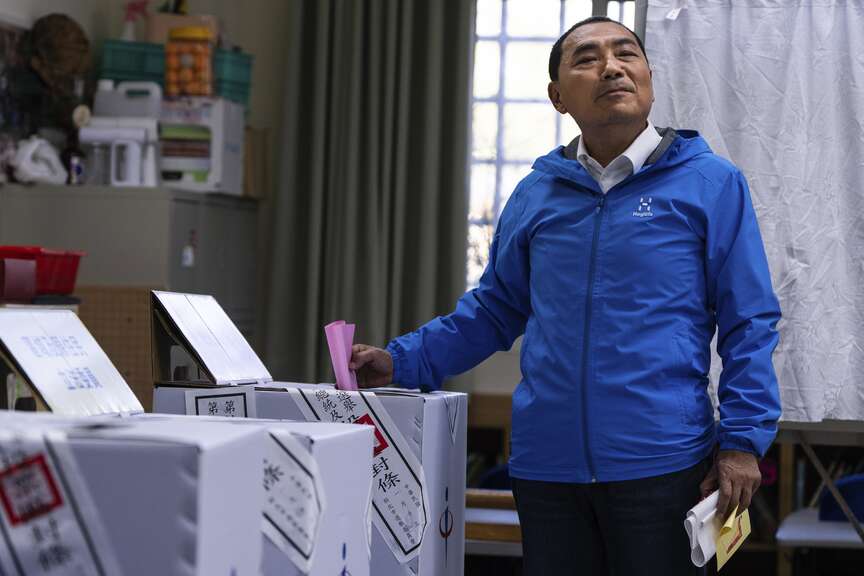 Kuomintang (KMT) presidential candidate Hou Yu-ih votes for the election in New Taipei City, Taiwan, on Saturday, Jan. 13, 2024. Taiwanese are casting their votes Saturday for a new president in an election that could chart the trajectory of its relations with China over the next four years. (AP Photo/Louise Delmotte)
Kuomintang (KMT) presidential candidate Hou Yu-ih votes for the election in New Taipei City, Taiwan, on Saturday, Jan. 13, 2024. Taiwanese are casting their votes Saturday for a new president in an election that could chart the trajectory of its relations with China over the next four years. (AP Photo/Louise Delmotte)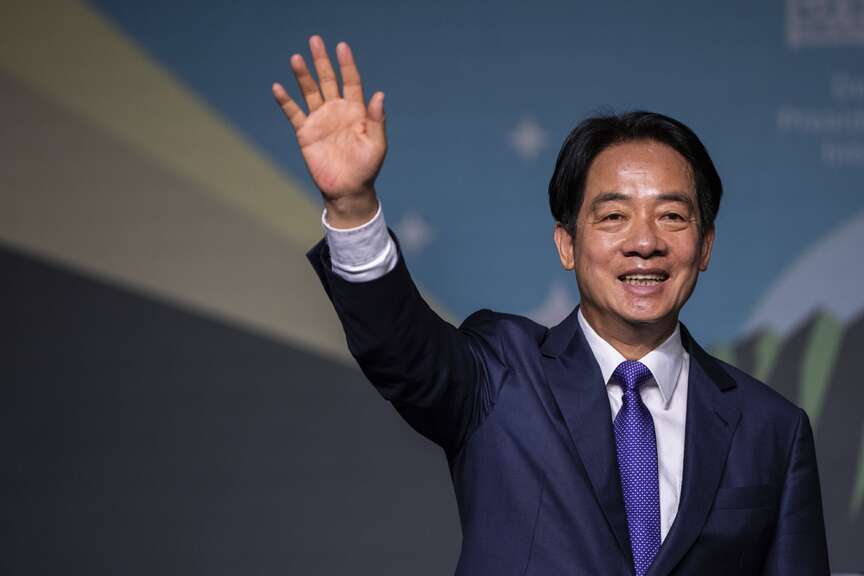 Taiwanese Vice President Lai Ching-te, also known as William Lai celebrates his victory in Taipei, Taiwan, Saturday, Jan. 13, 2024. The Ruling-party candidate emerged victorious in Taiwan's presidential election on Saturday and his opponents conceded, a result that will chart the trajectory of the self-ruled democracy's relations with China over the next four years. (AP Photo/Louise Delmotte)
Taiwanese Vice President Lai Ching-te, also known as William Lai celebrates his victory in Taipei, Taiwan, Saturday, Jan. 13, 2024. The Ruling-party candidate emerged victorious in Taiwan's presidential election on Saturday and his opponents conceded, a result that will chart the trajectory of the self-ruled democracy's relations with China over the next four years. (AP Photo/Louise Delmotte)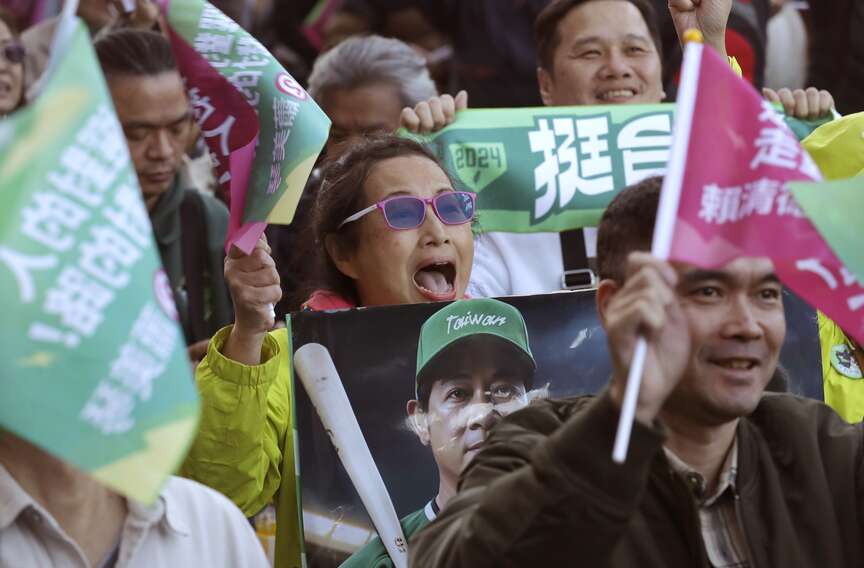 Supporters of Democratic Progressive Party presidential candidate Lai Ching-te cheer for election returns in Taipei, Taiwan, Saturday, Jan. 13, 2024. Polls closed Saturday in Taiwan's presidential and parliamentary election that will chart the trajectory of the self-ruled democracy's relations with China over the next four years. (AP Photo/Chiang Ying-ying)
Supporters of Democratic Progressive Party presidential candidate Lai Ching-te cheer for election returns in Taipei, Taiwan, Saturday, Jan. 13, 2024. Polls closed Saturday in Taiwan's presidential and parliamentary election that will chart the trajectory of the self-ruled democracy's relations with China over the next four years. (AP Photo/Chiang Ying-ying)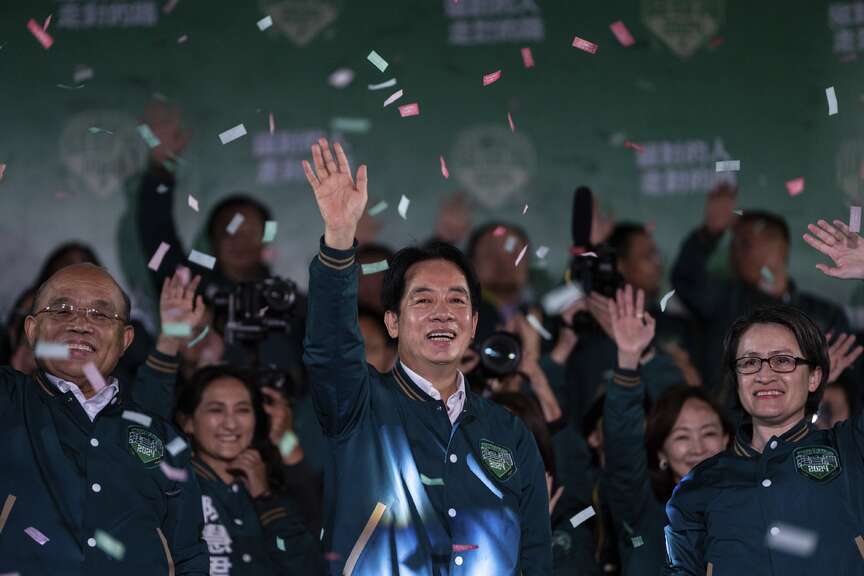 Taiwanese Vice President Lai Ching-te, also known as William Lai, left, celebrates his victory with running mate Bi-khim Hsiao in Taipei, Taiwan, Saturday, Jan. 13, 2024. The Ruling-party candidate has emerged victorious in Taiwan's presidential election and his opponents have conceded. (AP Photo/Louise Delmotte)
Taiwanese Vice President Lai Ching-te, also known as William Lai, left, celebrates his victory with running mate Bi-khim Hsiao in Taipei, Taiwan, Saturday, Jan. 13, 2024. The Ruling-party candidate has emerged victorious in Taiwan's presidential election and his opponents have conceded. (AP Photo/Louise Delmotte)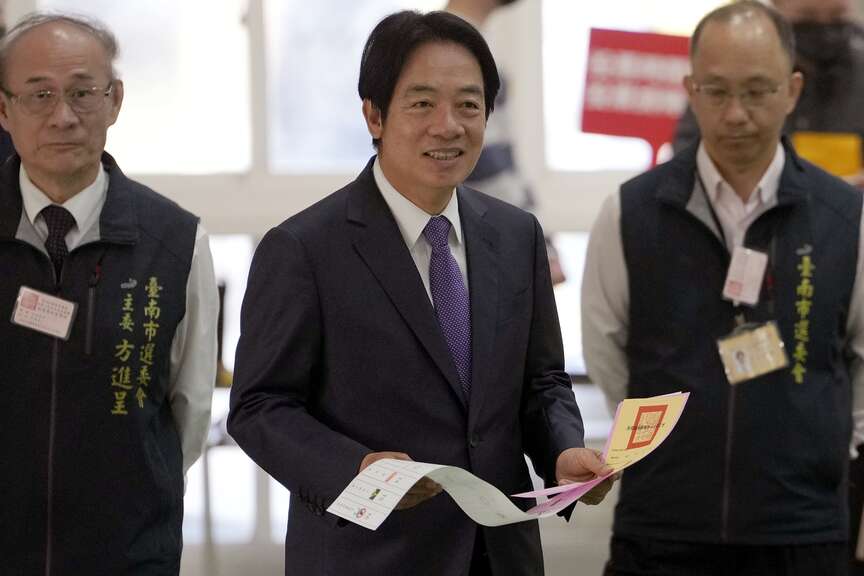 Democratic Progressive Party presidential candidate Lai Ching-te, center, who also goes by William, walks with ballot papers to cast at a polling station in southern Taiwan's Tainan city on Saturday, Jan. 13, 2024. Taiwanese are casting their votes Saturday for a new president in an election that could chart the trajectory of its relations with China over the next four years.(AP Photo/Ng Han Guan)
Democratic Progressive Party presidential candidate Lai Ching-te, center, who also goes by William, walks with ballot papers to cast at a polling station in southern Taiwan's Tainan city on Saturday, Jan. 13, 2024. Taiwanese are casting their votes Saturday for a new president in an election that could chart the trajectory of its relations with China over the next four years.(AP Photo/Ng Han Guan)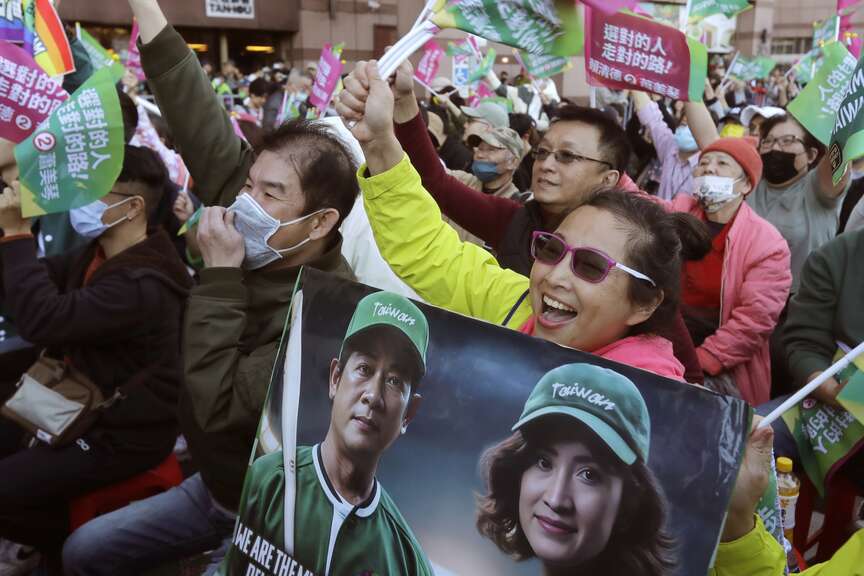 Supporters of Democratic Progressive Party presidential candidate Lai Ching-te cheer for election returns in Taipei, Taiwan, Saturday, Jan. 13, 2024. Polls closed Saturday in Taiwan's presidential and parliamentary election that will chart the trajectory of the self-ruled democracy's relations with China over the next four years. (AP Photo/Chiang Ying-ying)
Supporters of Democratic Progressive Party presidential candidate Lai Ching-te cheer for election returns in Taipei, Taiwan, Saturday, Jan. 13, 2024. Polls closed Saturday in Taiwan's presidential and parliamentary election that will chart the trajectory of the self-ruled democracy's relations with China over the next four years. (AP Photo/Chiang Ying-ying)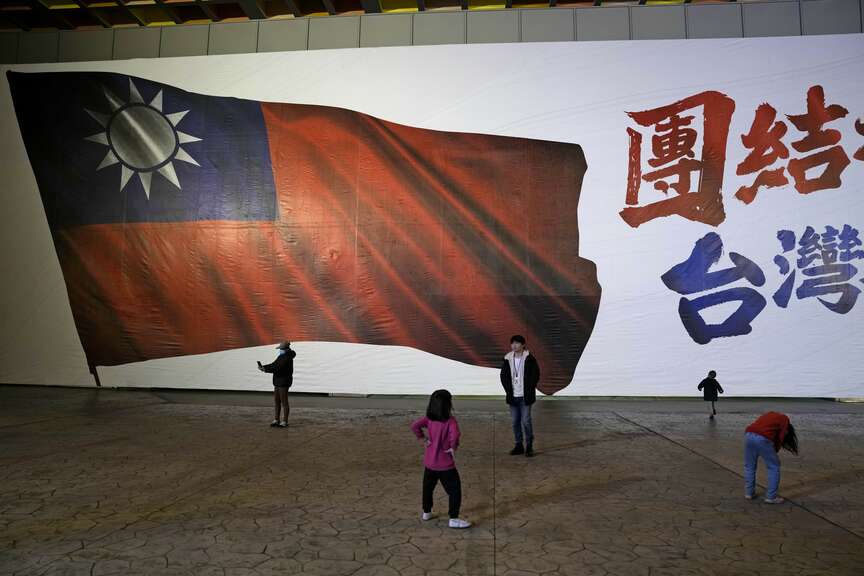 Children play in front of an image of a Taiwanese national flag as votes are counted in New Taipei City, Taiwan, Saturday, Jan. 13, 2024. Polls closed Saturday after Taiwanese cast their votes for a new president and legislature in an election that could chart the trajectory of the self-ruled democracy's relations with China over the next four years. (AP Photo/Ng Han Guan)
Children play in front of an image of a Taiwanese national flag as votes are counted in New Taipei City, Taiwan, Saturday, Jan. 13, 2024. Polls closed Saturday after Taiwanese cast their votes for a new president and legislature in an election that could chart the trajectory of the self-ruled democracy's relations with China over the next four years. (AP Photo/Ng Han Guan)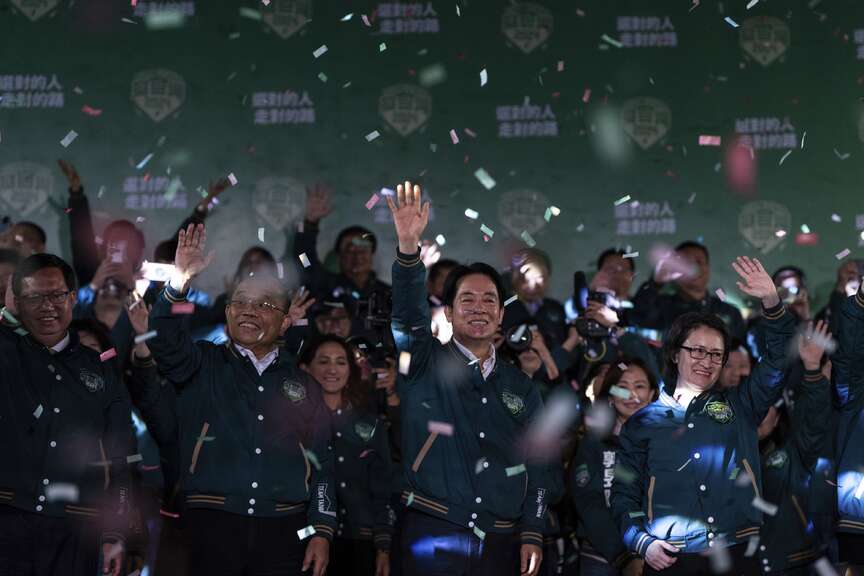 Democratic Progressive Party candidate Lai Ching-te, with Bi-khim Hsiao by his side, celebrates with supporters in Taipei, Taiwan, Saturday, Jan. 13, 2024. The Ruling-party candidate emerged victorious in Taiwan's presidential election on Saturday and his opponents conceded, a result that will chart the trajectory of the self-ruled democracy's relations with China over the next four years.(AP Photo/Louise Delmotte)
Democratic Progressive Party candidate Lai Ching-te, with Bi-khim Hsiao by his side, celebrates with supporters in Taipei, Taiwan, Saturday, Jan. 13, 2024. The Ruling-party candidate emerged victorious in Taiwan's presidential election on Saturday and his opponents conceded, a result that will chart the trajectory of the self-ruled democracy's relations with China over the next four years.(AP Photo/Louise Delmotte)
